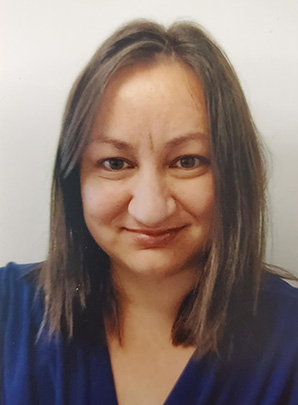For Any Cancer Diagnosis
- Q.
I'm receiving chemotherapy and have been gaining weight. Is that normal?
A.Many people undergoing chemotherapy treatments experience changes in their body weight—either weight loss or weight gain. If you notice that you are gaining weight, it is important to tell your health care team. Your doctor will need to evaluate the cause of this change, since there are many factors that may be contributing to it. Once your doctor diagnoses the causes, then you, your doctor, and health care team can develop a plan to treat your weight gain.
Eating is such an important part of our social activities, including getting together with friends and family, celebrating birthdays, anniversaries, holidays and other special occasions. Your doctor may recommend that you consult with a dietitian who can suggest eating tips to help you find a balance between enjoying your favorite foods at special occasions, while watching what you eat. In addition, your doctor may recommend that you speak with a doctor of rehabilitation medicine or a physical therapist so that you can start an exercise program to help with weight management.
The most important thing to remember is that a change in weight is often due to cancer treatments and is not your fault. Because weight gain affects how we look and how our clothes fit, many people decide to join a support group or seek individual counseling to find new ways to cope with their changed body image.
We offer additional information about coping with cancer:
- Your Health Care Team: Your Doctor is Only the Beginning
- Relaxation Techniques and Mind/Body Practices: How They Can Help You Cope with Cancer
- Coping with Cancer During the Holidays
- Strengthening the Spirit
- Coping with Cancer: Tools to Help You Live
To speak with a social worker who can provide support and also find local counseling or support groups, call 1-800-813-HOPE (4673) or email info@cancercare.org.
- Q.
My mother is undergoing chemotherapy treatments and her appetite is poor. She has a doctor's appointment next week. I plan to go with her but don't know what to say to her doctor.
A.It is wonderful that you are helping care for your mother and your important role is known as a “caregiver.” Going with your mother to her appointment can be very helpful since good communication with her doctor will improve the quality of care she receives. Your mother may feel overwhelmed and needs your help to sort through the doctor’s instructions on managing her poor appetite.
Before this visit with the doctor, write down any questions the two of you would like to ask. Make your questions as specific as possible and ask your most important questions first. Bring a notebook or tape recorder so you can keep track of the doctor’s answers and refer to them later.
Questions to ask her doctor:
- What could be causing my mother’s poor appetite?
- Are there any ways to improve my mother’s appetite?
- Can you arrange for her to meet with a dietitian to help us plan her meals and snacks?
- Is there any medication that would help to improve her appetite?
You may also want to learn about organizations that help with care at home. Ask your mother’s doctor or hospital social worker about local home health agencies.
CancerCare publications that can help include:
- Tips for Managing Nausea and Increasing Appetite During Cancer Treatment
- Communicating With Your Health Care Team
- Caregiving for Your Loved One With Cancer
The National Cancer Institute offers:
- Q.
I am going through treatment and need help covering the costs of practical things, like nutritional drinks and medical supplies. Are there resources available?
A.The cost of nutritional supplements as well as other supplies can be an added and unforeseen expense for many cancer patients.
For help with nutritional supplements, first check your insurance policy to learn whether these supplies are covered and under what circumstances. For example, Medicaid, Medicare and some private insurance will pay for nutritional support for patients that need feeding tubes for more than three months.
Other possible sources of support are patient assistance programs offered by the product manufacturers. You can search medicineassistancetool.org to find out about any other nutritional assistance programs.
You can also contact a social worker through your hospital to find out what local agencies might provide discounts or other cost savings on medical supplies.
- Q.
How can I find an exercise program that is adjusted for physical limitations I have due to having had cancer? I can't walk like I used to, because I have nerve damage in one leg and I tire easily. I thought yoga or Tai Chi, but I can't do the normal sets. Any ideas what kind of exercise I can do or where I can find modified plans?
A.Your question identifies one of the most important aspects of cancer survivorship – continued self-care. Exercise improves post-treatment fitness and strengthens your ability, in both mind and body, to cope with the after-effects of cancer.
The first step in starting any exercise program is to consult a doctor, either your oncologist or general practitioner. Ask him/her for a referral to an occupational or physical therapist, who can help you customize an exercise routine based on your age, present fitness level, and any limitations caused by cancer or its treatment. This can help increase your flexibility and bone and muscle strength, which are crucial to improving balance and preventing falls. Some techniques can even be performed sitting or standing. For more information, see our booklet, Caring for Your Bones When You Have Cancer.
Health professionals can also help you find exercise programs in your community, such as yoga, Tai Chi, qigong, and other gentle movement classes that are tailored to cancer survivors. Such classes may also be found at your local YMCA, senior center, or Cancer Support Community. Mind-body techniques (including deep breathing and relaxation exercises) will improve your focus and energy level. Learn more by reading our fact sheet, “Relaxation Techniques and Mind/Body Practices.”
You may also want to see a neurologist to treat the nerve damage, or neuropathy, that is limiting your movement. A neurologist may prescribe medications, acupuncture, or relaxation exercises to relieve your pain and discomfort.
Another way to improve your ability to exercise is to consult a nutritionist or registered dietitian: finding a diet tailored to your specific needs can help increase your energy and rebuild your muscles and bones. The American Cancer Society has comprehensive nutrition information for before, during, and after cancer treatment.
Even if you are fatigued and tire easily, start slow. Any exercise is better than none. Consult the American Society of Clinical Oncology for information on how to practice this. Instead of walking for an hour, walk for 5-10 minutes several times a day. Give yourself credit for any exercise you do, and reward yourself when you are able to do more. Remember to celebrate each small success.
- Q.
My 69-year-old father is going through chemotherapy now and has little to no appetite and vomits up whenever he does eat. He is okay to drink meal-replacements such as Ensure. Should I mix in protein powder (like the kind you purchase for weight training) into these Ensure drinks to give him extra protein? Will this help him or will it cause a negative effect? Is there anything else I can do to help him have enough calories through the day?
A.While we are not medically trained at CancerCare, as oncology social workers we are trained in assisting you address concerns that accompany a cancer diagnosis. Nutrition is an essential part of your father’s health and integral part of his cancer treatment. It is important to bring these questions regarding his nutrition and also the difficult side effects he is experiencing to the medical team. Your father’s oncologist, physician assistant or nurse may have some beneficial medical advice to assist your father reduce side effects and maintain his nutrition. A registered dietitian can also be an important member of your father’s medical team and his oncologist can provide a referral if needed. Before you meet with the medical team make sure to write down your questions and concerns to assist you and also take notes during your meeting. This can be incredibly helpful so that you don’t forget what questions you want to ask and also have written notes of what the medical team said. Good communication with the medical team will increase your father’s quality of care. For more info read our fact sheet, “Doctor, Can We Talk?: Tips for Communicating With Your Health Care Team.
You can also find more information about about nutrition and managing nausea and vomiting through CancerCare’s website.
For Lung Cancer
- Q.
I was diagnosed with non-small cell lung cancer and am receiving chemotherapy. I've had two colds within a three-week period and also a low level of hemoglobin in my blood (the doctor has recommended erythropoietin treatments). Could these issues be diet related?
A.Chemotherapy for either small cell or non-small cell lung cancer tends to be fairly aggressive and can produce some difficult side effects. While chemotherapy is focused on destroying lung cancer cells it can also interferes with the production of the three types of blood cells: red blood cells, white blood cells, and platelets. Normally, just before you start a chemotherapy session, your doctor arranges for you to have blood tests to determine the effect the chemotherapy is having on your blood cells. Low counts of any of these cells may prompt either a change in dosage or frequency of treatment, or a need to take medication that can stimulate bone marrow production of the blood cells.
Your colds may be due to the chemotherapy’s suppression of the bone marrow’s production of white blood cells, which are the body’s infection fighters. If your doctor feels that your white cell count has significantly decreased, he or she may consider putting you on a medication for this condition. Ask your doctor whether this might be a possibility.
Similarly, the low levels of hemoglobin you mention may be due to low red blood cell counts caused by chemotherapy. Red blood cells carry oxygen and iron to provide the body with components necessary for energy. Red blood cells are an important factor in maintaining energy levels in our bodies and too few of them can result in fatigue and anemia. It sounds like your doctor believes an erythropoietin-type drug might be helpful in boosting your red blood cell count. While extreme low red blood cell counts are not normally related to diet, you might also want to ask your doctor for a referral to a dietitian who works with cancer patients to develop a meal plan that would increase your dietary intake of iron and help you maintain a healthy weight.
CancerCare offers publications that provide more detailed information on managing chemotherapy side effects.

 Answered by
Answered by  Answered by
Answered by  Answered by
Answered by  Answered by
Answered by  Answered by
Answered by